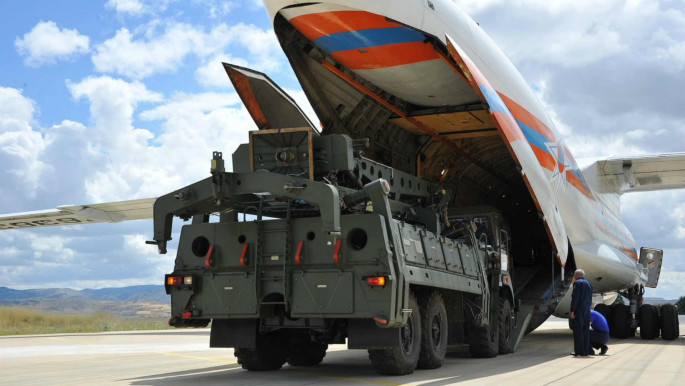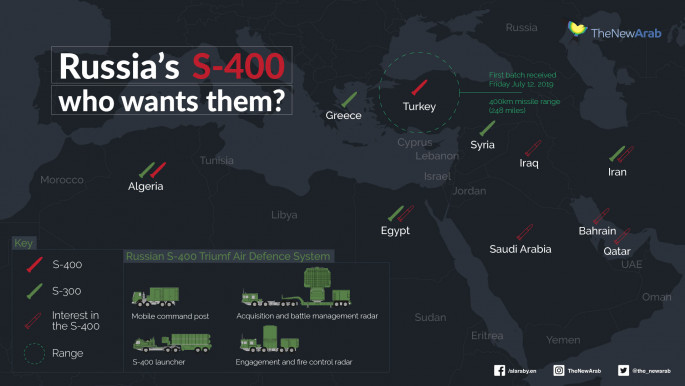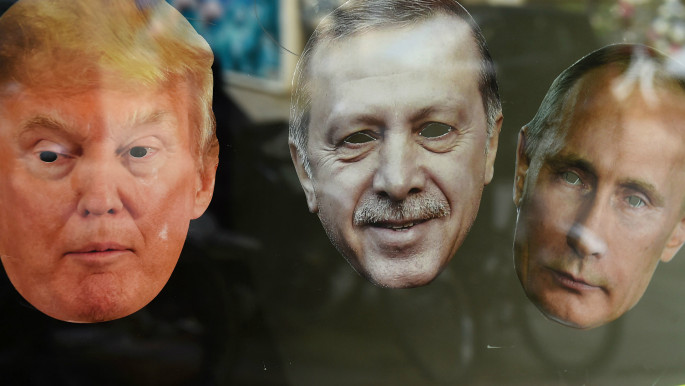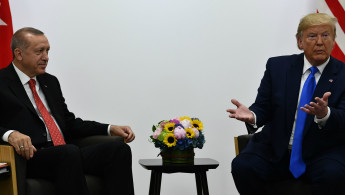How long can Turkey avoid US sanctions for its S-400 missile purchase?
Turkey has so far managed to avoid incurring US sanctions for its purchase of the Russian S-400 air defence missile system, which is estimated to have cost Ankara approximately $2.5 billion.
The Trump administration clearly doesn't want to slap any sanctions on Ankara for this despite the fact it's legally obligated to do so under US federal law. How long Turkey can ultimately avoid punishment from the US for its purchase has, therefore, still yet to be seen.
Under the Countering American Adversaries Through Sanctions (CAATSA) law, US President Donald Trump is legally obligated to place economic sanctions on any country that makes a "significant transaction" in purchasing Russian military hardware, but the Trump administration is hoping to find a way around this law.
Republican Senator Lindsey Graham, a close ally of Trump, has suggested that Turkey can avoid facing sanctions provided that the missiles are not activated.
"I'm in the camp of, if they don't activate the S-400, the sanctions don't have to be applied," Graham said.
"My hope is to persuade Turkey not to active [sic] the system because it's so disruptive to the relationship. My pitch to Turkey was, let's stand down on the S-400, let's start free trade agreement negotiations."
 |
|
| Read also: Elusive US-Turkey deal over Syrian safe zone complicated by S-400 crisis |
Turkey began taking delivery of the first S-400 parts in mid-July. It was consequently removed from the F-35 Joint Strike Fighter programme since the US military will not tolerate its foremost warplane operating in a military alongside such a sophisticated Russian missile. This is because the US military fears the F-35's stealth capabilities could become compromised.
The US also says it's unacceptable for Turkey as a NATO member to field such advanced Russian-made missiles.
Graham's view and pitch is likely one more-or-less shared by President Trump, who opposes putting sanctions on Turkey for its purchase.
Trump has lamented the fact that Turkey has been booted from the F-35 programme for its purchase, saying it isn't "a fair situation".
It remains unclear if Turkey will get a refund for the $1 billion payment it has already made for its order of over 100 F-35s that aren't going to be delivered.
However, Turkish Foreign Minister Mevlut Cavusoglu denied that Ankara has been expelled from the F-35 programme.
"Removing us from the F-35 programme is not being discussed," he claimed, according to Urdu Point.
"I think we will find a consensus,” he added, before then warning: "Otherwise, both countries will take steps that will hurt their relationship."
 |
|
Turkish President Recep Tayyip Erdogan has said Turkey's S-400s will not be activated until next April, giving Ankara a considerable amount of time to negotiate some kind of a compromise with Washington.
The Trump administration will likely try to prevent sanctions from being imposed to avoid another rupture in the increasingly complicated US-Turkey relationship. It's unclear, however, if it's not already too late.
Turkey recently threatened to launch a large-scale operation into northeast Syria against US-allied Kurdish fighters. Washington scrambled to prevent it and both sides reached a preliminary agreement to establish a 'safe zone' along the border instead.
There is some indication that Erdogan threatened military action to extract concessions from the US, one of them being avoiding serious sanctions over its S-400 purchase.
The Turkish president recently reiterated his belief that "Trump won't allow Turkish-US relations to become captive of the S-400 issue."
 |
The Turkish president recently reiterated his belief that 'Trump won't allow Turkish-US relations to become captive of the S-400 issue' |  |
He also believes that cordial one-on-one relations between him and Trump will help mitigate the fallout from the S-400 purchase. Trump's statements clearly indicate that he too wants this to be the case. At the same time, however, it's unclear if Trump can sidestep laws and Congress over this issue indefinitely. This doesn't mean he won't try.
For months now, Trump has cynically used emergency laws to fast-track the delivery of $8 billion worth of arms to Saudi Arabia, the UAE, and Jordan while completely bypassing Congress. The president also vetoed three joint resolutions which aimed to stop these sales.
Timur Akhmetov, an Ankara-based Middle East analyst for the Russian International Affairs Council argues that for Turkey the "issue of the S-400s has proved to be good negotiation leverage over the United States."
"Turkey is enjoying alternative strategic options in terms of arms deliveries and using it in her efforts to reshape relations with the US," Akhmetov told The New Arab.
"Rhetoric aside, nobody in Ankara really wants a serious rupture of relations, which would place Turkey in a very precarious situation, considering ongoing instability around its borders in the Middle East," he said.
"However, sanctions are not a good option either, the worsening economic situation has already shown its negative effect on ratings of the Turkish President and his ruling party."
 |
|
| Read also: How will the S-400 vs F-35 saga between Turkey and the USA end? |
Akhmetov also believes that "Turkey may try to use S-400 further as leverage against the US position over bilateral relations and nature of cooperation in the region, northern Syrian being the primary issue.
"Considering that it takes roughly 10-15 minutes to deploy the S-400, Ankara can use it to pressure Washington into further compromises or at least into more sincere dialogue over problems that bother the Turkish government," he said.
Turkey frequently argued that it was being unfairly singled out for buying S-400. For example, Erdogan previously pointed to Turkey's neighbour Greece, a NATO member that possesses S-300s, the older brother of the S-400, but never faced serious scrutiny for it.
 |
Erdogan previously pointed to Turkey's neighbour Greece, a NATO member that possesses S-300s, the older brother of the S-400, but never faced serious scrutiny for it |  |
The context he invariably neglects to mention, however, was that Greece received the missiles from Cyprus in the late 1990s. The reason Nicosia purchased them in the first place was to deter Turkish military overflights of its airspace.
Turkey immediately vowed to destroy those S-300s the moment they arrived on the island, igniting a crisis that lasted from early 1997 until late 1998, when the missiles were transferred to Greece.
The systems were stored on the Greek island of Crete for approximately 15 years. They have been activated for use in military exercises. Athens test-fired them for the very first time in 2013 as part of its White Eagle military exercise that year.
The Israelis reportedly got the opportunity to train their air force against them, training that will doubtlessly come in handy in any potential future confrontation with Iranian, and now Syrian, S-300s.
While Erdogan has alleged hypocrisy in the case of Greece possessing S-300s it now appears that those in Washington who don't want to slap sanctions on Turkey over the S-400 are hinting that he should take a similar course of action.
Namely, put the S-400s in storage for the foreseeable future, out of sight and out of mind, and then hope this whole thing blows over before it does irreparable damage to Turkish-US relations.
Paul Iddon is a freelance journalist based in Erbil, Iraqi Kurdistan, who writes about Middle East affairs.
Follow him on Twitter: @pauliddon


![Minnesota Tim Walz is working to court Muslim voters. [Getty]](/sites/default/files/styles/image_684x385/public/2169747529.jpeg?h=a5f2f23a&itok=b63Wif2V)






